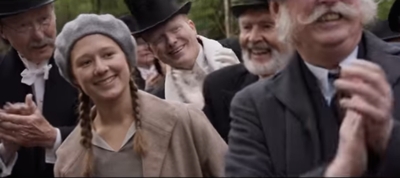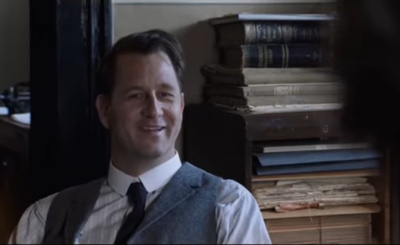Grade: B+/A-
Drama
Rated R
On the heels of Barbie comes this review of Christopher Nolan’s Oppenheimer—the other half of the Barbenheimer cultural phenomenon, where moviegoers took to seeing both films in tandem this past summer.
Nolan’s sweeping saga, a blend of color and black-and-white sequences, stars Cillian Murphy as theoretical physicist J. Robert Oppenheimer, who directed work at the Los Alamos National Laboratory and successfully tested the first atomic bomb. After President Truman made the decision to drop A-bombs on Hiroshima and Nagasaki, Oppenheimer became a victim of his own conscience and Republican-led McCarthyism—the latter resulting in him being kicked to the curb for “red” associations, even as (or partly because?) he saw the horror of the bomb they created and pushed for international control of nuclear weapons.
Oppenheimer isn’t a lock to win the Oscar for Best Picture, but I’d be very surprised if it didn’t, because it’s the kind of film that voters have gone for in previous years:
—It’s a biopic, and from the earliest BP Oscar-winning The Great Ziegfeld through films like Patton and Gandhi to more recent entries like The King’s Speech, Hollywood has often had a soft spot for films based on real people and true stories—even ones like Oppenheimer, which focus on a very specific time in a historical figure’s life. In this case, from 1922-63, with the bulk taking place between 1938, when Oppenheimer realizes that nuclear fission could be weaponized, and 1954, when his career is threatened by a hearing to determine if he is a threat to national security.
—It’s a social commentary “message” film, like such previous winners as Driving Miss Daisy, 12 Years a Slave, Green Book, Moonlight, Spotlight, Parasite, Nomadland, and CODA. We see scientists question whether they’re doing the right thing by creating a super bomb, and we see a level of caution that all suggests they had no real idea of exactly how great and how destructive the A-bomb would be. For all the intellectual brilliance assembled at Los Alamos, there was also a startling level of naiveté, and we also see Oppenheimer staring at his reflective decisions in the rear view mirror. Oppenheimer was billed as a thriller, but with a security clearance hearing that functions as a trial providing the narrative structure, it feels more like a tense courtroom drama.
—It’s also a historical epic, and Hollywood has always been a sucker for epics when it comes to Best Picture voting. The very first BP winner (Wings) was a historical epic. Such films offer an in-depth but also broad sweeping treatment of material suggesting consequences that reach far beyond the characters’ lives, whether it’s the settlement of the West (Cimarron), the fall of the Old South (Gone with the Wind), or an ill-fated voyage (Titanic) that still has a ripple effect. Epic stories often have epic lengths, like Ben-Hur, Lawrence of Arabia, The Bridge on the River Kwai, or Chariots of Fire. And Oppenheimer, which runs 3 hours—another reason I preferred Blu-ray to movie theaters.
Most importantly, Oppenheimer has gravitas—a weightiness and solemn seriousness that testifies this is a HUGE topic in the annals of history and the evolution of humankind. The film is about a serious topic and brainy people, produced now when anti-intellectuals are as vocal and politically active as they were during the time of Oppenheimer’s hearing. That makes Oppenheimer even more relevant, and the factor most likely to earn the film a Best Picture statue.
Murphy said he starved and practically tortured his body to become as gaunt as Oppenheimer—something he vowed never to do again. I hope he’s pleased with the results, because the only way Oppenheimer would be more convincing is to have Oppenheimer play himself. Even then, I’m not so sure that he could express wordlessly what Murphy is able to do in order to suggest what’s going on inside that brilliant mind. In this, Nolan uses visual techniques reminiscent of what Ron Howard in A Beautiful Mind (another BP winner) did to suggest the complicated visionary mind of mathematician John Nash, who became involved in his own secret work that turned nightmarish.
The cast is epic, but make no mistake—this is Murphy’s film, with stolen moments by Emily Blunt (as Kitty Oppenheimer), Robert Downey Jr. (convincingly aged and periodized to look like a ‘40s and ‘50s politician), and Matt Damon (who plays the military head of the Manhattan Project and Oppenheimer’s immediate superior).
The only head-scratcher is Nolan’s somewhat gratuitous insertion of two sex scenes that really showed more skin than anything of Oppenheimer’s character or plot points. There were other ways to suggest womanizing, other ways to suggest the appeal he had for women (not unlike the appeal that Henry Kissinger famously had—intellectuals are sexy to some women!), and certainly other ways to suggest the woman was a member of the Communist party.
Inception and Dunkirk both received Best Picture nominations but did not win. Oppenheimer ought to be the one to give Nolan the big prize.
Entire family: No (older teens only)
Run time: 180 min., Color/Black & White
Studio/Distributor: Universal
Aspect ratio: Mixed 2.20:1 and 1.78:1
Featured audio: DTS HDMA 5.1
Bonus features: B+
Rated R for some sexuality, nudity, and language
Language: 7/10—More f-bombs than you can count on one hand, and various other curse words
Sex: 6/10—Just those two gratuitous lovemaking scenes showing full-body (no genitalia) nudity in muted light in the process of having sex; did Nolan opt for them to get an R rating thinking it would add to the gravitas?
Violence: 3/10—The film is about mass killing, but it’s all conceptual or reported after-the-fact, off-camera; one disturbing scene, shot kaleidoscopically, shows a woman committing suicide.
Adult situations: 5410—It was the era a smoking and social drinking, and the film reflects that
Takeaway: Nolan has only been making films for some 15 years, but his body of work is already impressive, with brainteasers like Memento and The Prestige, his Batman trilogy and Man of Steel, and thought-provoking thrillers like Inception, Interstellar, and Tenet, and historical blockbusters like Dunkirk and Oppenheimer; it’s anyone’s guess what he does next, but you can bet stars will be nudging each other out of the way to get onboard

























